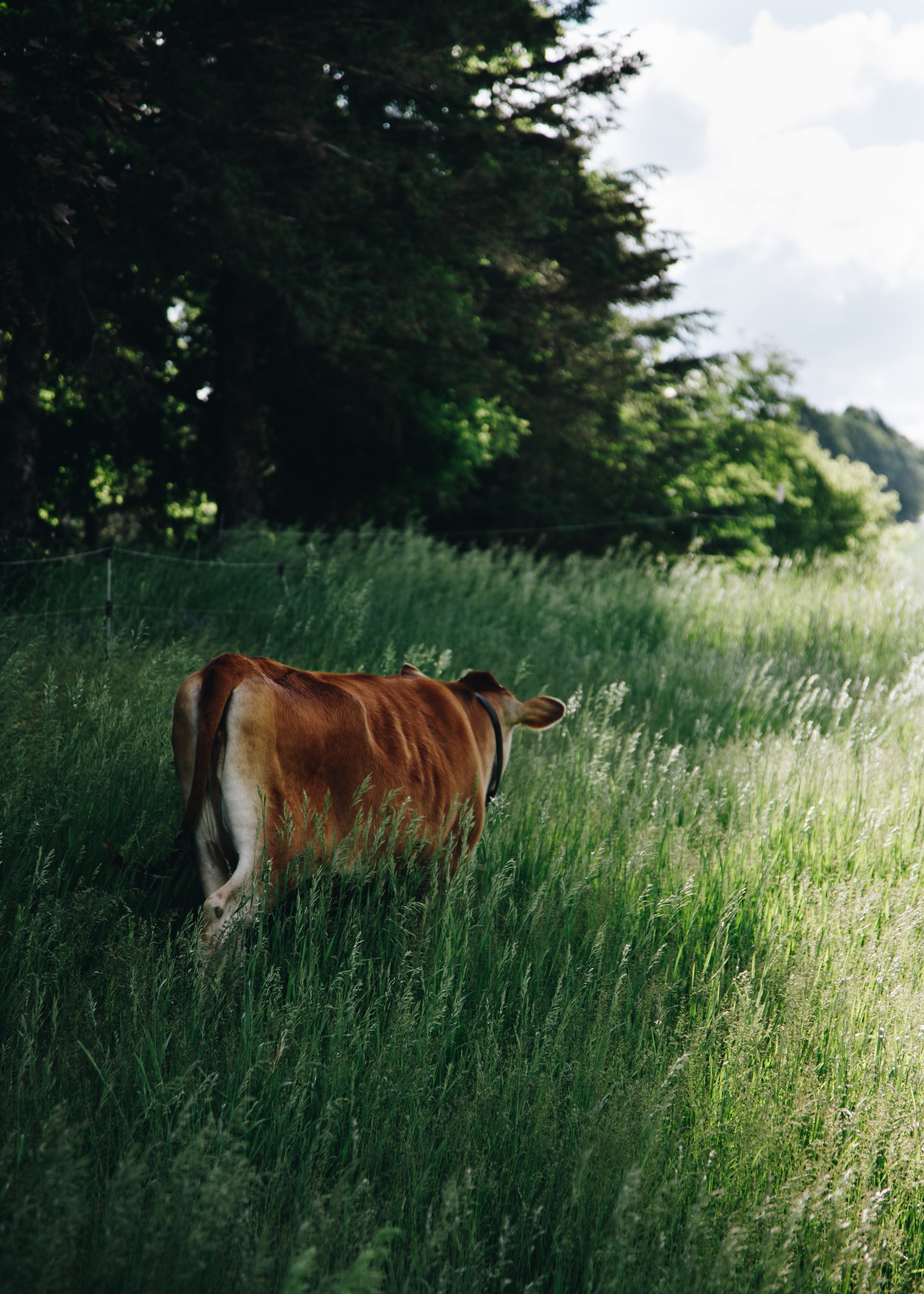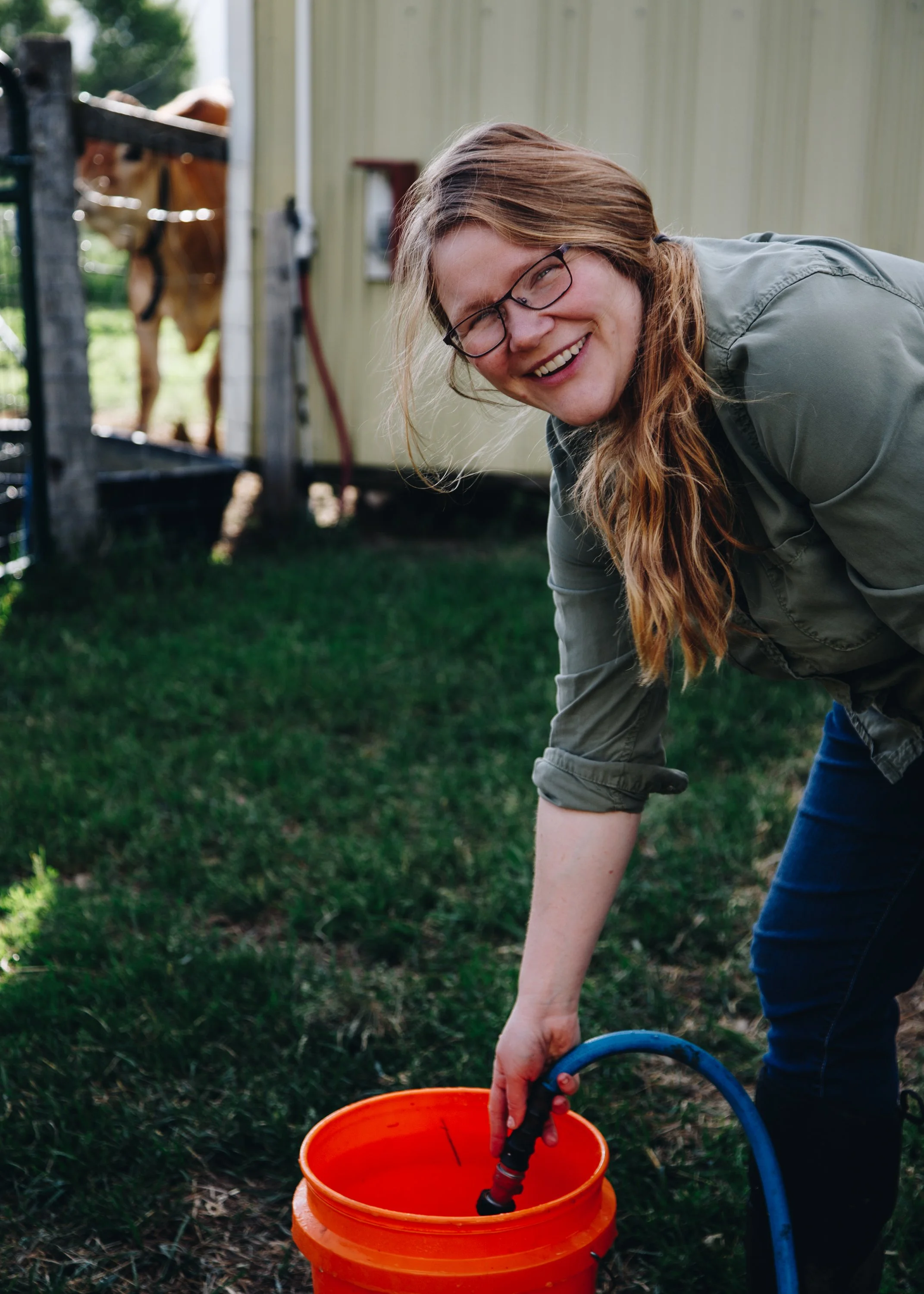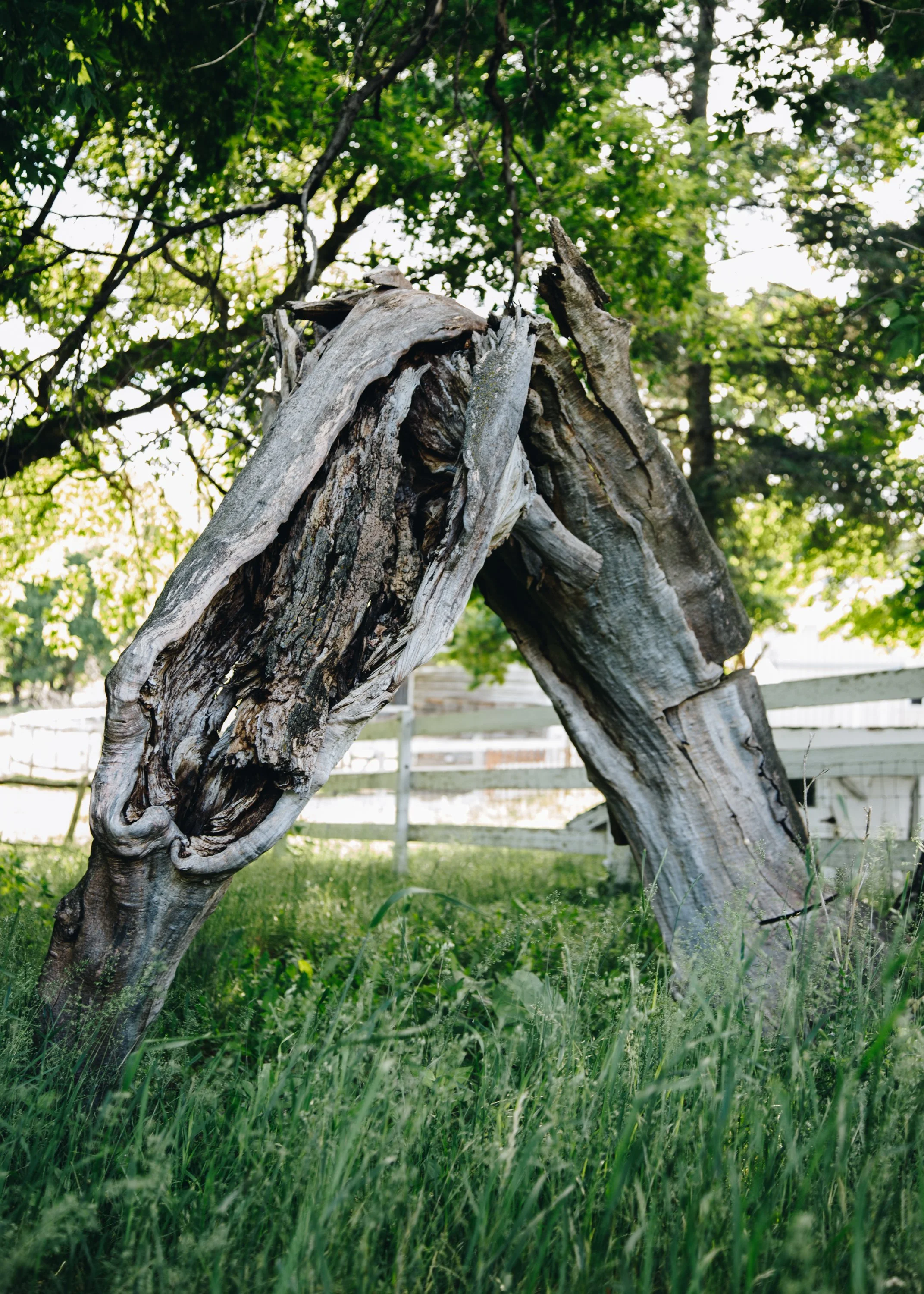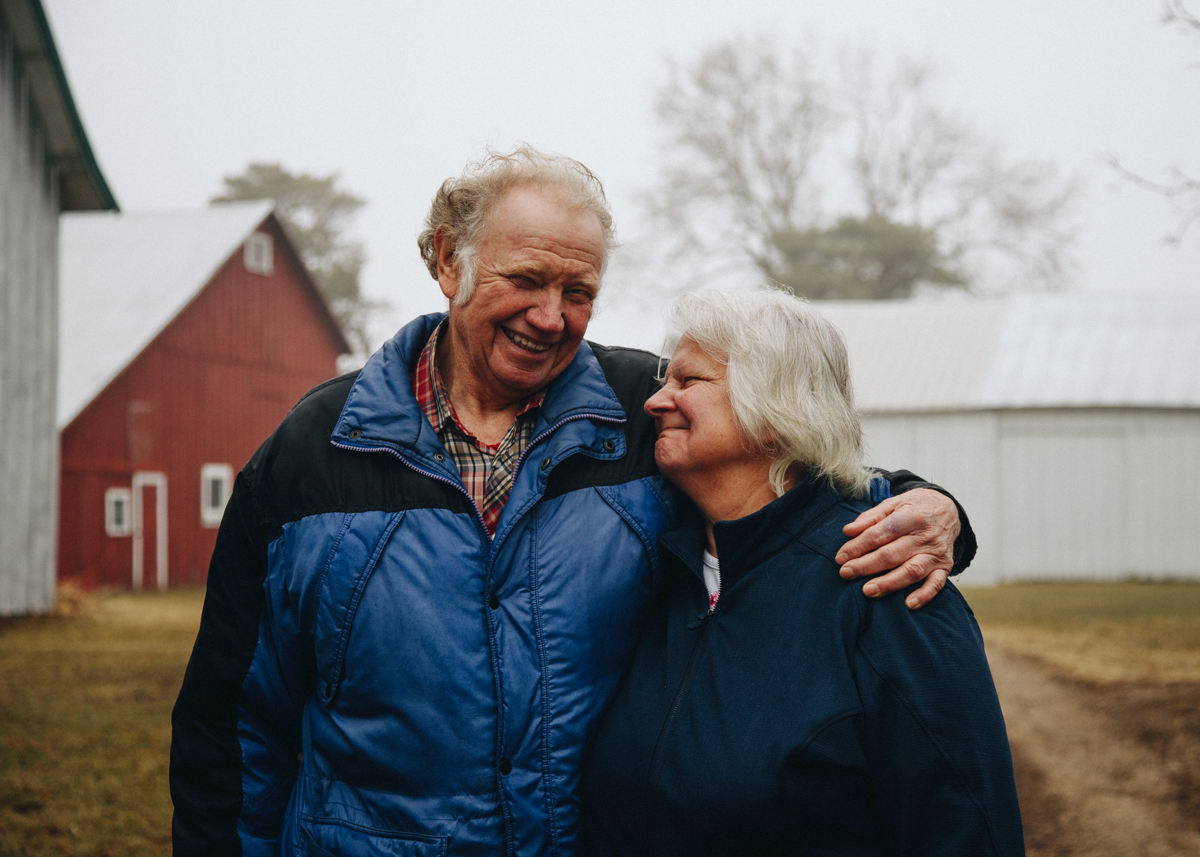Farming as a Way of Life: In Conversation with Rough and Tumble Farmhouse.
On Rough and Tumble Farmhouse outside of Pelican Rapids, Minnesota, Kelsey Wulf is taking on motherhood, farming, and the art of soil health in a mission to care for the land, animals, and community around her.
Interview Curation by: Sarah Wescott | Responses by: Kelsey Wulf | Photo/Videography by: Sarah Carroll
Want the exclusive Rough and Tumble Farmhouse Zine?
Get it sent directly to your inbox!
I’m in! Send me the Rough and Tumble Farm Zine.
This summer, we chatted with Kelsey about her journey into farming life. Continue reading for insights into farming as a woman, the beauty of small intentional animal agriculture, and the benefits of pasture-based farming.
Tell me about yourself! Did you grow up in the farming world?
My name is Kelsey Wulf and I am the farmer at Rough and Tumble Farmhouse. I grew up in Pequot Lakes, in the Brainerd Lakes area where my family lived a few miles outside of town on a small plot of land. Growing up, we spent hours making fires and mud soup, and adventuring.
My mom occasionally kept a garden, but we never really grew our own food and we certainly didn’t get into food preservation. My main exposure to farming was on my grandparent’s farmstead in North Dakota where my grandpa grew row crops. The only animals they kept were Louise, a cunning miniature Wiener dog, and a shelterbelt of wild cats. As a kid, they would tell me stories about my grandma canning and preserving foods well before my time. I began to love our visits out west and imagined that one day I would have my own farmstead.
That sounds like such an amazing upbringing! Was there a specific memory that cemented your interest in farming?
As I mentioned, I always wanted to be on a farm as a kid. It just seemed that being out in the country with your own eggs and milk and a garden was the best way a person could live. What else would you need?
I always hoped I'd end up on a small farm just for fun, but never saw it as what could be a way of life, a way to make a living, or a way to support and care for other people.
I very clearly remember watching the documentary Food, Inc. when I was 19 years old. It paints a rough picture of conventional farming, but the ending is a celebration of sustainable agriculture and small farms. My jaw hit the floor. I had no idea there was a movement of people realizing my dream.
Throughout the next few years of college, I honed in on my interest in agriculture. Mexican American Studies course? Let's do a paper on Cesar Chavez and the Farm Workers Liberation Front. Persuasive creative writing assignment? Let's talk about why hemp should be legally grown in the US.
Eventually at a homestead conference at Happy Dancing Turtle, I met students from the Sustainable Food Production program based in Fergus Falls. Shortly after I changed my plans and decided to go back to school for the one-year program. Eleven years later, I live in that same community with a small farm of my own.
It’s interesting how full circle that journey was. What products do you offer today?
We raise laying hens and sell their eggs. The hens are also an important part of our pasture based system. The chickens spread the manure of our larger animals through their natural scratching. This keeps the soil fertile and reduces work on my end.
We sell raw milk from our tiny grass based dairy. I got my first cow while working on a CSA that realized milking wasn’t for them. My cow had a daughter, Juneberry, who is now my ride or die. I would sell off every other animal on this farm, down to the mice in the barn, if it meant I could keep my Jersey girl.
With cows also comes milk, cheese, and butter which keep my family well stocked. We wind down milking around Christmas and start up again in May to give the girls some time off. I find winter to be incredibly important. A time for us and the animals to all rest and recoup.
Aside from dairy cows, we also keep a herd of beef steers and a herd of dairy goats. I use beef tallow or goat’s milk to make soap.
We also use the farm for education. In 2020, I started a blog and YouTube channel in 2020. I started it in hopes to make a little income, but more than that I wanted to be a resource to other small farmers and homesteaders, particularly women who are farming on their own.
I wanted to show that a woman can be out here raising babies and building a farm. Sometimes it comes out ugly but gets the job done. I want others, no matter their gender, to believe they can get out on the land.
It sounds like you take such an intentional approach to farming. What does farming mean to you?
It's just life, isn't it? I knew when I went to college I wanted a job where I would help people. I remember being overwhelmed by the need in so many places. When I discovered agriculture, this kind of agriculture, it changed everything.
Farming responsibly, with care and love, patience and persistence, it touches everyone and everything: soil health, wildlife, water quality, human health, immigration, animal welfare, local economies, community, etc.
It might not seem like growing a garden or raising chickens is a revolutionary act, but it is. To eat, whether you are a vegetarian, vegan, or a meat eater, you are taking from something. Might be taking soil life, or habitat, or clean air, or the life of an animal.
For me, I look at that and think, “How can we live and eat while also returning nourishment to the land, water, and animals that feed us?” We need to give back as much as or more than we took from the environment in the first place.
What a worthy farming pursuit. Who makes up your farming family?
I'd say about 96% of the farm work is my own, but I couldn’t do this work without the support of my family.
My husband likes the idea of the farm and supports it, but he is not a hard labor type of guy. He also doesn't really have the patience it takes to work with and train animals.
My dad comes to visit a few times a year and will work way harder than a 62 year old man should to help me move along some important projects. Dad is a jack of all trades. He could build you a house with just an idea in his head. Phenomenal.
My mom also visits once or twice a month and watches my girls so I can bust my ass for a weekend on projects I can't get done with a baby on my hip.
Lastly, my two sweet girls. Jane (age 3) will help pick tomatoes, snack on green beans, and tell the goats they are beautiful while she pets their noses. Louisa is just shy of a year old so she mostly smiles and squeals with delight.
What a crew! I’d love to hear about your farming practices. What can customers expect from Rough and Tumble Products?
All our animals are on pasture, rotated every day or every other day during the growing season. I'm always out there looking at my grass, trying to add more diversity, build the soil, and keep it safe. Pasture rotation is good for the animal's health (keeps parasites at bay, thus reducing the need for dewormers) and excellent for the soil.
Unlike conventional dairies, I milk share with our calves. This means the babies get all the mom time and milk they want during the day. At night, the little ones hang out together and the moms are separated from them so we can milk in the morning.
A lot of traditional dairy farmers say there isn't enough money in this. I don't really care. I have no interest in separating moms and babies for the sake of profit.
In addition, our 30 chickens are completely free range. It does pose some predator risks but we mitigate that as best we can. Their feed is free of gmos, corn and soy.
In contrast to conventional egg production, we also occasionally allow our broody hens to hatch their own eggs. A broody hen has had a hormonal shift that is telling her she needs to have babies, now!
Rather than preventing her from doing so, we let her sit on some eggs for a month and hatch baby chicks. This means that we have new chickens, but we also have to make sure we don’t have too many as I then need to find them new homes. This is known by homesteaders as chicken math!
What is one big lesson that farming has taught you?
If I have to pick one it would be patience. It takes patience to get a new animal to trust you. Patience to train a cow to milk. Patience to wait for the cheese to age and see if you did everything just right. It takes patience to learn a new skill. Patience for new chicks to grow old enough to lay eggs. Patience for this year's babies to grow old enough to become mothers. Patience with yourself as you learn from your mistakes. Farming is a slow, quiet thrill. It's a long game.
What's one thing you wish everyone knew about ethical food and farming?
That it's not cheap! People don't realize the real cost of their food and are often shocked by small farm prices. We sell our eggs for $4.50 a dozen. To feed non-gmo, soy and corn-free feed, we figured out we make about $15 a month on eggs. If you break that down to a per hour rate when you consider chicken chores and packing eggs, it's less than a dollar per hour.
Where can consumers buy your products?
Raw milk has to be purchased directly on the farm. We aren't legally allowed to advertise it either so to be clear, this is not an ad.
For more information on state by state laws on raw milk, click here.
Eggs can also be purchased on the farm or at MANNA Co-op. Starting in 2023, we will be at the Fergus Falls Farmers Market with eggs, soap, and other farm made goods.
That’s great to know. Lastly, I would love to know more about your farming future. What do you have in mind?
In the future, I would love to move to a bigger property with more pastureland. My dream is to have a small licensed on farm creamery with a niche product. Maybe yogurt, butter, cheese, etc.
I'd also like to expand the products I offer with beef calves or pastured pork. Next year, we plan to add bees and meat chickens for the family. Eventually, I will start raising them for our customers.
I'd love to have a way for the community to access our farm as well. Classes, cheese tasting, etc. It’s essential that people can see, touch, smell, taste, and experience ethical local agriculture.
This farm feature was produced in partnership with the MANNA Food Co-op.
























